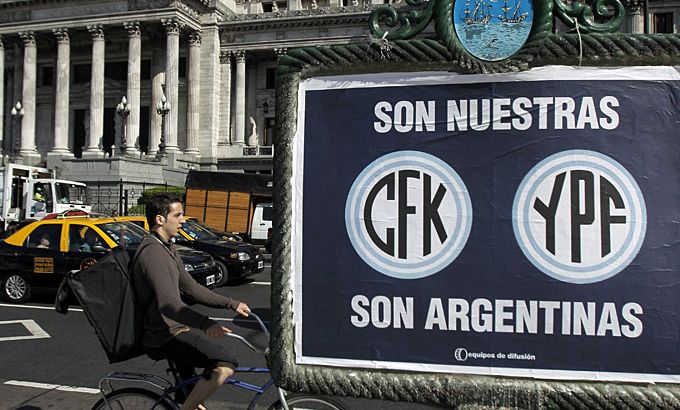
Will import curbs revive Argentina’s economy?
The government says recent trade restrictions are meant to stimulate growth, we ask if it is the correct prescription.
Argentina’s government recently imposed restrictions on imports, making many foreign good and components unavailable in the country, and the supplies are running low.
In April the country’s biggest oil company, YPF, previously owned by the Spanish company Repsol, was nationalised.
Keep reading
list of 4 itemsWhy are nations racing to buy weapons?
Parallel economy: How Russia is defying the West’s boycott
US House approves aid package worth billions for Ukraine, Israel
Christina Kirchner, the Argentinian president, said the aim is to stimulate the domestic economy.
|
“Sometimes I find it hard to understand this particular outrage. We’re talking about a practice many countries with natural resources actually implement …. The contribution those resources can make to the treasury is much greater than imposing taxes or royalties on foreign investors.“ – Aldo Caliari, Argentinian economist |
The restrictions include requiring all importers to obtain licences that are not automatically renewed, for products ranging from cars to electronics. Starting February, every import transaction has to be pre-registered and pre-approved. The import-substitution rules require foreign companies to produce goods domestically or lose market access. All importers are also required to balance imports with exports.
Argentina has averaged a seven per cent annual growth between 2003 and 2011 and high commodity prices have fuelled the country’s economic recovery.
But it defaulted on its debt and devalued its currency in 2002. The country recovered under the Kirchners, with billions of dollars spent on subsidies and public welfare projects.
Many foreign investors however have been reluctant to enter Argentina under the Kirchners.
In recent months Argentina’s agricultural and industrial output has slowed down. Most analysts predict 2.5 to three per cent growth this year for Argentina’s economy, with the inflation rate estimated to be more than 20 per cent.
|
“What we’re seeing is Kirchner and her government trying to assert control over, in most basic terms, how the country makes money …. To say that bad management is the same as no management is not correct, there has to be some level of intervention.” – Alex Gibson, a specialist in Argentinian politics |
On Friday, the EU initiated legal proceedings at the World Trade Organization (WTO), angered by Kirchner’s bold moves on imposing protectionist policies.
The EU argues that Argentina’s restrictions have already affected imports worth more than $600m. Domestic critics argue that the country will pay a heavy price by missing out on foreign investment.
But the government is unapologetic, saying that international trade rules are stacked against developing countries, and that it seized YPF to avoid an oil crisis, with ministers dismissing critics as ‘free market fundamentalists’.
Reacting to the EU’s criticism Kirchner sad: “We have a policy that protects our work, our businesses, our economy. It’s as if this is considered legal protectionism when it is done by developed countries…and populist protectionism when it is done by emerging countries.”
Inside Story Americas asks: Is protectionism the way forward for Argentina amid slowing economic growth?
Joining presenter Anand Naidoo to discuss this and related developments are guests: Aldo Caliari, the director of the Rethinking Bretton Woods Project, a think tank which aims to reform global financial institutions; Alex Gibson, a specialist in Argentinian politics from the Council on Hemispheric Affairs; and Diego Guelar, an opposition politician and former Argentinian ambassador to the EU and US.
|
“For sure the import curbs are going to hurt Argentina. More than a protectionist policy this is beginning to be desperation…due to a clear deficit in the international current account of payments and in the national budget.” – Diego Guelar, Argentinian opposition politician |
EU-ARGENTINA TRADE SPAT:
- The EU files a suit against Argentina at the World Trade Organisation over import curbs, opposing Argentina’s rules that require importers to have licences
- Argentina requires all import transactions to be pre-registered and pre-approved; foreign companies are required to produce more goods in Argentina
- All importers in Argentina are required to balance imports with exports
- The EU says Argentina’s import curbs violate international trade rules, but Argentina argues that global trade rules are stacked against the developing world
- President Cristina Kirchner says the aim is to recover sovereignty over natural resources; that Repsol had failed to make agreed investments to expand output; and that Argentina is facing sharp rises in its oil import bill
- Repsol has filed a class-action suit in a New York court against Argentina, seeking at least $10bn in compensation from the Argentinian government